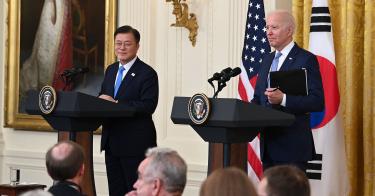The same people who decried Donald Trump’s "America First" foreign policy as isolationist (even though it wasn’t) now praise Joe Biden’s "globalism." Yet Biden’s statesmanship is more crimped that a hermit crab’s social life.
Biden has resurrected Obama’s risk-averse foreign policy. It’s the kind of close-your-eyes-to-real-world-threats approach that led to tragedies such as a terrorist Caliphate in the Middle East, a Putin-occupied Crimea and a smoking corpse-strewn U.S. diplomatic compound in Benghazi.
Trump wasn’t big on foreign adventurism, regime change, and nation-building. He was, however, happy to make clear to America’s adversaries that if they messed with America, they would get very messed-up themselves.
He made that clear in a way that matters—with deeds not words. He helped build a stronger NATO and gave Ukraine weapons to defend itself against Russia. He took out Qasem Soleimani, head of Iran’s Islamic Revolutionary Guard Corps, when he directly threatened to kill Americans. And when Kim tried his old nuclear blackmail game, Trump refused to lift any sanctions.
>>> 5 Early Unforced Joe Biden Foreign Policy Errors
These are not the acts of an isolationist. Nor were they reckless. Trump is one of the few presidents in the modern era who didn’t start a war.
Biden appears to be fundamentally different from Trump, and not just in the superficial ways that folks focus on. Yes, Trump trumpeted "American Greatness," whereas Biden hypes "international cooperation."
In practice, however, Biden’s internationalism, like Obama’s, is a pernicious type of isolationism that covers a desire to withdraw from the world in the same way Trump’s bluster masked a realist recognition that America’s global interests can’t be defended by pulling away from the planet.
For starters, Biden is happy to cheerlead for an international agenda that allows him to press his progressive platforms here at home.
Climate policy is one example. Biden is happy to sign on to the Paris Accord that requires "nationally determined contributions," because it gives him another rationale for determining what the "contribution" is, picking winners and losers in domestic energy, environment, and economic policies.
When it comes to hard power, however, Biden’s preference is clearly to do less with less. By less, we don’t mean less tax dollars. The administration, for example, seems anxious to: throw money at Latin America to address the "root causes" of the border crisis he caused; bail out the Mullah’s busted economy in Iran; or refund the United National Relief and Works Agency for Palestine Refugees so Palestinian extremists can have plenty of cash on hand.
Put another way, Biden is all for foreign policy by ATM. And, when that’s not enough… when hard power is needed… well, he’ll lead from behind. That’s why he offered-up a defense budget that wouldn’t cover the cost of inflation.
For Biden, this is the less risky way in the world. By deliberate self-weakening, others will perceive the U.S. as less of a threat. By not doing the hard-muscle work, there is less of a danger in the U.S. getting dragged into messy problems.
Most importantly, by economizing on the military, the administration can pour even more resources into transforming America into a progressive paradise.
This strategy of risk aversion permeates virtually aspect of Biden’s policy. He wants to placate Iran. He wants to find ways to cooperate with China and Russia. He wants to start making trade-offs with North Korea. He’ll make nice with Cuba—again—and cozy up with the Taliban.
>>> 5 Myths About Trump’s Foreign Policy
Like Obama, Biden will try to disengage as much hard power as possible from the conduct of foreign affairs and lean increasingly on diplomatic jaw-jaw lots and lots of "foreign aid."
The problem with a risk-averse strategy is that it introduces a lot of risk. By shrinking the safety net of American power, it leaves lots of open space for bad people to do bad things. Not surprisingly—they do.
When Obama tried it we got Benghazi, Russian aggression, more Cuban meddling in Latin America, Chinese island-building in the South China Sea, an Iran run wild, and expanded and threatening nuclear weapons and missile testing in Korea.
One shudders to think what we may get this time around.
This piece originally appeared in Fox News




